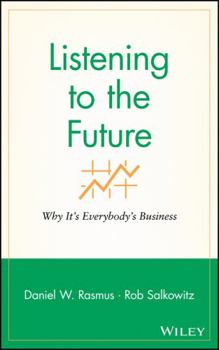Listening to Future-Retail (MSEL)
Select Format
Select Condition 
Book Overview
Listening to the Future: Why It's Everybody's Business explores the challenges and opportunities facing organizations, the transformations that will ripple through the political, economic, and social environments, and the implications for different industries in the 21st century workplace. Written by Microsoft forecasters Daniel W. Rasmus and Rob Salkowitz, this important book equips your business to get out in front of new technology innovations...
Format:Hardcover
Language:English
ISBN:0470413441
ISBN13:9780470413449
Release Date:December 2008
Publisher:Wiley
Length:256 Pages
Weight:1.00 lbs.
Dimensions:1.0" x 6.3" x 8.9"
Customer Reviews
3 ratings
Blended Generation Perspective
Published by Thriftbooks.com User , 15 years ago
Listening to The Future offers a great deal of information and potential conditions, as well as scenario planning possibilities that can serve as a backdrop to many of today's business challenges, and more importantly to those challenges on the horizon. As an organizational architect, taking the "people" perspective of corporate life, Chapter 3 on "Prospering in a Blended World" was of specific interest. Understanding the impact of blended workforces; how this will impact middle management (a group that deserves more developmental attention than most organizations provide) is key to be strategically competitive. Chapter 6 "From the New World of Business to the New World of Work" also contains many interesting calls to actions. Recognizing the role of transparency is critical to remaining competitive, but it connects back to valuing what the youngest of generations expect from the workplace. As the world changes, so do people's expectations about what they want from a company from an employee and a customer perspective. Listening to the Future is the only way to be proactive and prescient. Good read, highly recommend.
The future according to Microsoft
Published by Thriftbooks.com User , 15 years ago
Two quotes immediately flashed across my mind as I started reading Listening to the Future by Dan Rasmus, a key soothsayer at Microsoft, and Rob Salkowitz, a free ranger in the Microsoft ecosystem who occasionally wanders further afield. The first is a Kant quote: we see not what is, but who we are. The second is due to Alan Kay, a big name in the hoary past of my employer, Xerox: the easiest way to predict the future is to invent it. Looking out and ahead at the future is as much a synthetic and introspective act as it is a predictive act, even if you don't explicitly set out to introspect or synthesize. Microsoft's visions of the future merit some belief simply because the vast energies of that 600 lb gorilla, channeled by those visions, might be sufficient to bring them about. Goliaths win more often than we suspect, because Goliath beating David doesn't make the news. For you and me, this book is vastly more interesting for what it reveals about the strategic culture at Microsoft than for what it reveals about the future (which is interesting enough in its own right though). The governing paradigm of the book might be called Scenario Planning 2.0. If strategic cultures were cars, this would be a PT Cruiser. Scenario planning is an approach to imagining the future that relies on specific background narratives; grand What-Ifs against which your foreground ideas can be war-gamed. To get at their big what-ifs, Rasmus and Salkowitz looked at the bewildering variety of variables that people think (or panic or daydream) about -- aging Baby Boomers, green issues, terrorism, peak oil -- and pick out two: globalization and workforce democratization, to serve as the key ones. Each of these two variables is used to create a dichotomy axis that separates out mutually-exclusive futures. The result is the 4 quadrant picture of mutually exclusive types of futures pictured above. Here are these four scenarios: * Proud Tower: Globalization succeeds, the workforce organizes itself into hierarchical, vertically-integrated global mega-organizations, created by increasingly integrative M & A activities, and populated by Organization Man 2.0. * Continental Drift: Globalization fails, the workforce organizes itself in large, intra-national corporations whose agendas are subservient to national agendas * Frontier Friction: Globalization fails, the workforce organizes itself into anarchic, non-hierarchical and fluid forms * Freelance Planet: This assumes more and more people will become wholly or partially free agents and organize themselves outside of corporations. Rasmus' research group evaluates technology and business ideas against these futures, for relevance and business value, and most importantly, robustness. The premise is that if an idea seems to hold up against the hypothetical forces these four scenarios might unleash, then it is probably worth investing in. The authors explain this approach with the colorful metaphor of wind-tunnel testing: good
Listening to the Future - Why It's Everybody's Business
Published by Thriftbooks.com User , 15 years ago
This is a worthwhile read because it covers a number of important issues about strategic planning and frameworks for thinking about future trends. It's interesting to learn about the future scenarios Microsoft has envisioned for itself about "the future of work". They can have an affect on all of us. The author(s) can be forgiven for some choppy spots, given the breadth of the subject. There were spots when it appeared as though the target reader had changed, lacking clearer transitions. These are minor matters; it contains some useful concepts and concise case studies that should provoke good discussion within an organzation.






